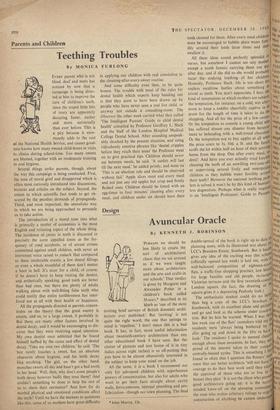Parents and Children
Teething Troubles
By MONICA
FURLONG Several things strike parents, though, about the way this campaign is being conducted. First, the tone of moral grief and disapproval which is often most curiously introduced into discussions, lectures and articles on the subject. Second, the extent to which scientific fact tends to get ob- scured by the peculiar demands of propaganda. Third, and most important, the unrealistic way in which we are being approached to persuade us to take action.
The introduction of a moral tone into what is primarily a matter of economics is the most English and irritating aspect of the whole thing. The incidence of caries in teeth is discussed in precisely the same appalled tones as the fre- quency of road accidents, or of sexual crimes committed against small children, with never an irreverent voice raised to remark that compared to these intolerable events, a few dental fillings or .even a whole mouthful of them don't matter a hoot in hell. It's nicer for a child, of course, if he doesn't have to keep visiting the dentist, and esthetically speaking, good teeth are better than bad ones, but there are plenty of adults walking about with well-fitting false teeth who could testify that entire toothlessness has inter- fered not at all with their health or happiness.
All the propaganda directed at parents concen- trates on the theory that the great enemy is sweets, and so, to a large extent, it probably is. But there are many other factors involved in dental decay, and it would be encouraging to dis- cover that they were receiving equal attention. My own dentist once admitted that he found himself baffled by the cause and effect of dental decay. 'Take my own two children,' he said. 'The boy rarely touches a sweet, has an absolute obsession about hygiene, and his teeth decay like anything. The girl, on the other hand, munches sweets all day and hasn't got a bad tooth in her head.' Well, then, why don't some people's teeth decay however badly they treat them? And couldn't something be done to help the rest of us to share their resistance? And how far do morbid physical and emotional conditions affect the teeth? Until we have the answers to questions like this, some of us mothers have great difficulty in applying our children with real conviction to the cleaning-after-every-sweet routine.
And some difficulty even then, to be quite honest. The trouble with most of the rules for dental health which experts keep handing out is that they seem to have been drawn up by people who have never seen a real live child, or anyway not outside a consulting-room. The Observer the other week carried what they called 'The Intelligent Parents' Guide to child dental health' compiled by Professor Geoffrey L. Slack and the Staff of the London Hospital Medical College Dental School. After sounding unspeak- ably shocked by the present situation, and using ridiculously emotive phrases like 'dental cripples before they reach their teens' the Professor went on to give practical tips. Children should never eat between meals, he said. 'A surfeit will last till the next meal,' he added primly, and went on 'This is an absolute rule and should be observed without fail.' Apple slices must end every meal and not just any old apples but crisp and firmly fleshed ones. Children should be timed with an egg-timer to four minutes' cleaning after every meal, and children under six should have their teeth cleaned for them. After every meal chit must be encouraged to bubble plain water I ibly around their teeth three times and swallow it.
All these ideas sound perfectly splendid in vacuo, but somehow I cannot see any mother except a tooth fanatic carrying them out daY after day, and if she did so she would probablY incur the, undying loathing of her chat rot Honestly, Professor Slack, life is too short for endless mealtime battles about something at trivial as teeth. You don't appreciate, I fear, the kind of temptations to which mothers are subject; the temptation, for instance, on a cold, wet after' noon to keep a toddler cheerfully captive in its pram for the length of time it takes to dc the shopping. And all for the price of a few SW CC' Or the temptation to console a young child whri has suffered almost any disaster from bereave ment to beheading with a well-timed chocclate. Or the temptation not to buy apples at all whet the price soars to Is. 10d. a lb. and the fa rnilY scoffs the lot within half an hour of their arrivioll home from the shop. One after every meal. in' deed! And have you ever actually tried for iblY cleaning the teeth of an unwilling two-year-old, or supervising several lively and enterprising children as they bubble water forcibly around their teeth? However the national teething prob' lem is solved it won't be by this kind of huni less dogmatism. Perhaps what is really required, is an 'Intelligent Professors' Guide to Part (Its' dreo ore-
then


































 Previous page
Previous page